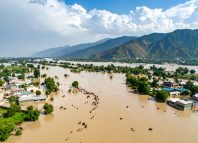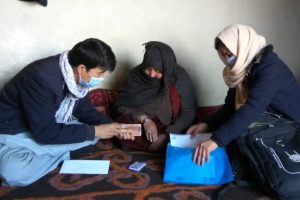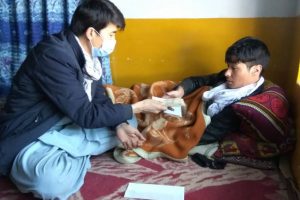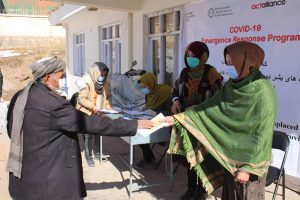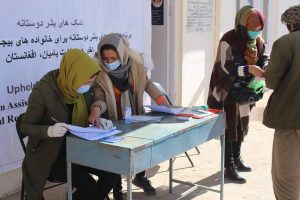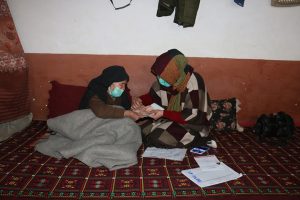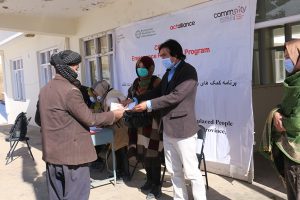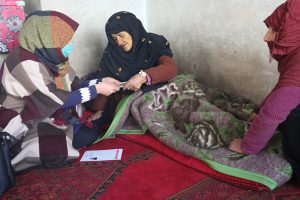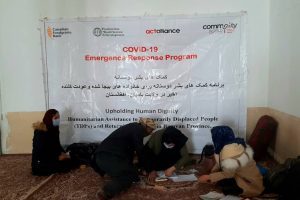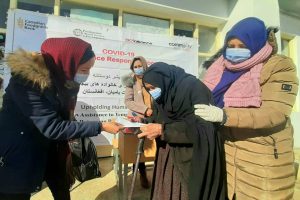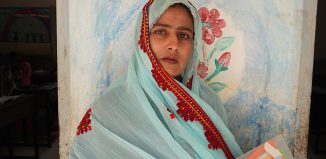Cash Assistance brings immediate relief to vulnerable refugee families in Afghanistan
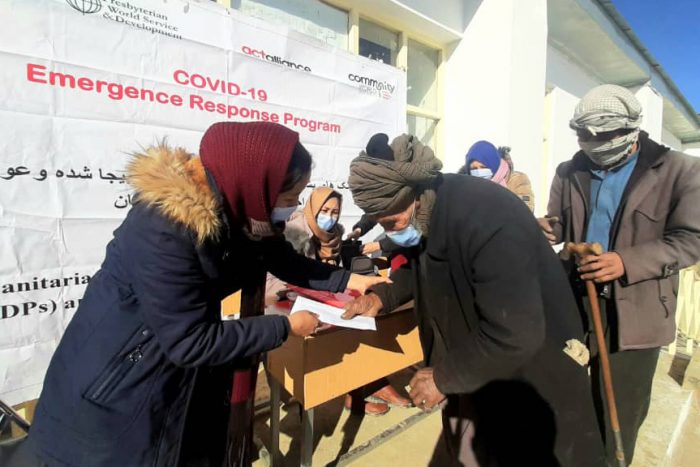
Community World Service Asia (CWSA) is implementing an emergency project responding to vulnerable families affected by COVID-19, in partnership with Presbyterian World Service & Development (PWS&D) in Afghanistan. The seven-month project aims to increase food security of most vulnerable temporarily displaced and returning refugee community households in Bamyan province.
Through the project, 1100 most vulnerable households[1] are targeted for assistance that will help them recover from grave food insecurity issues and provide access to essential NFIs[2] to improve their hygiene to protect themselves from the coronavirus.
Establishing accessible distribution sites
The distribution site for cash allocation was selected in close collaboration with relevant local government agencies, focal persons from within the target community and the Community Development Council (CDC)[3]. Centrally located, secure and easily accessible distribution points were jointly selected and finalized. Special consideration was given to ensure that the sites were easily approached by all community members, including women, the elderly and people with disabilities.
During the cash distributions the project team strictly adhered to COVID-19 SoPs, ensuring every community member in attendance wore a mask (providing masks for those who didn’t have) and established wash stations with provision of hand sanitizers and hand washing liquids. In order to prevent assimilation of large crowds and maintain a physical social distance, the distribution attendees were split into small groups. Each group was allocated a time slot for visiting the distribution point for cash collection.
Strong Collaboration at Provincial & National levels
The project team was in frequent coordination with relevant authorities at provincial and national levels at all stages of the project planning and implementation. All planned activities were implemented in close coordination with government authorities including the Directorate of Refugees and Repatriation (DoRR), Directorate of Labor & Social Affairs (DoLSA), Directorate of Economy (DoE), Provincial Governor Office (PGO), District Governor Office (DGO) and other relevant government bodies. The officials also monitored the project implementation processes.
The first and second cash distributions were attended and applauded by key government officials including the Deputy Provincial Governor, Director and other representatives of Bamyan DoRR[4], and district Governors.
Cash Assistance through E-transfers
Six-hundred and seventy-seven project participants will receive cash assistance via SIM cards distributed by a selected network of MOMO[5] agents. The mobile company will register the project participants in their system, and will distribute SIM cards accordingly to registered users.
The project implementation plan and project participants list for cash transfers through the MOMO system was shared with the MTNA mobile company to start the participants’ registration on their system. As of today, more than 480 project participants have successfully registered on the MOMO mobile money system and received their SIM cards.
Addressing food insecurity
Each family has been awarded USD 90 per month for a period of five months, as per FSAC[6] standards, which is considered sufficient to meet the immediate needs of an average of seven member[7] families for 30 days.
Cash support of AFN 6920 AFN (USD 90) has been granted to selected community members in Bamyan province to overcome food insecurity and strengthen community survival coping mechanisms[8]. During the second cash installment distribution, all recipient households were advised to use the cash for purchase of food and other immediate household necessities.
The direct cash distribution modality participants included persons with disabilities, elderly members and people with no national identification card (Tazkira). Participants were made aware that the cash assistance is conditional based on a mandatory 85-90 percent utilization of the cash on food purchasing and 15-10 per cent on other essential expenses, such as medical, hygiene and sanitary costs.
Cash transfers under the project are split into five monthly tranches and are scheduled for disbursement during the most food-insecure months (November 2020-April 2021) in the target areas. During this time, local communities in the region have very few livelihood opportunities and limited access to food and nutritional essentials. Farming activities during this time are limited due to the harsh winters and related recurrent natural disasters that hinder access to cities and supply chains.
Two cash distributions were carried out respectively in December 2020 and January 2021 in all target communities. A total of 1088 household in four districts have received two installments out of the 5 installments. Project participants received cash assistance in Baman Centre, Waras, Punjab and Yakawalang districts of Bamyan. The project participants who included elderly, sick or disabled persons who were unable to visit the distribution point, the project team visited their households to deliver the cash assistance, at their doorsteps. The remaining households are being coordinated with and will soon receive their installments.
Key Achievements & Challenges
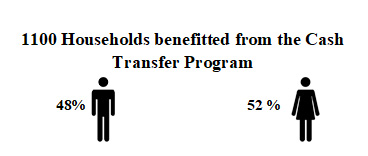 There is improved food stability as households have access to healthy food products. Additionally, other family needs were addressed that have minimized harmful coping mechanisms among the target families. The wide coverage of the project in four districts made it easier to reach most vulnerable households in remote areas. Close collaboration and participation of local government authorities accelerated the project process and helped carry out project activities successfully.
There is improved food stability as households have access to healthy food products. Additionally, other family needs were addressed that have minimized harmful coping mechanisms among the target families. The wide coverage of the project in four districts made it easier to reach most vulnerable households in remote areas. Close collaboration and participation of local government authorities accelerated the project process and helped carry out project activities successfully.
However, it was observed that the overall need for assistance was very high and that the project assistance scope was not adequate to reach all affected households. Some areas had weak network coverage, which also hampered coordination with communities and staff members of CWSA.
[1] IDP, returnees and most vulnerable communities who are in dire need of food and adequate nutrition.
[2] Non-Food Items
[3] Afghanistan’s districts have “Shura” (CDC), where members decide community’s affairs in consultation with those who will be affected by that decision. A “Shura” or CDC has its own leader, deputy, cashier and registered stamp for their affairs.
[4] Directorate of Refugees and Repatriation (DoRR)
[5] MOMO is a mobile phone-based money transfer service, payments and micro-financing service in Afghanistan.
[6] Food Security & Agriculture Cluster
[7] Average family size in area
[8] A coping strategy is an action taken by household to adapt and cope when shocks and other crises including COVID-19, disasters or conflicts strike which push them beyond the difficulties faced in “normal” times.

